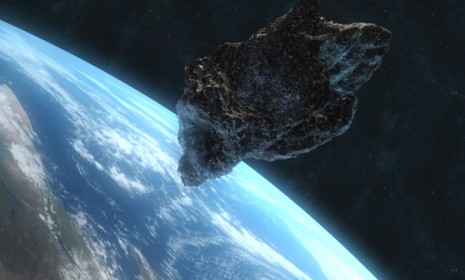How asteroid dust could help us cool down Earth
Scottish space scientists cook up an otherworldly plan to shade our planet from the sun's harmful radiation

A free daily email with the biggest news stories of the day – and the best features from TheWeek.com
You are now subscribed
Your newsletter sign-up was successful
Scientists in Scotland have developed an unorthodox plan to help fight climate change: They want to trigger a far-off asteroid to spew a large dust cloud into space. This dust would function as a cosmic shade to block some of the sun's harmful radiation from reaching Earth. Who's behind the project? And is it even feasible? What you need to know:
What's the plan, exactly?
Space experts at the University of Strathclyde in Scotland want to send a spaceship to an asteroid near Langrange point L1, "a site where the gravitational pull of the sun and the Earth balance each other to keep an object in relatively stable orbit," says Charles Choi at Live Science. The asteroid would then be outfitted with a device called a "mass driver." The mass driver would use electromagnets to "hurl asteroid-derived matter away from the giant rock" — essentially creating a gigantic dust cloud. The asteroid's gravitational pull would keep the sun-blocking dust steady instead of letting it disperse out into space.
The Week
Escape your echo chamber. Get the facts behind the news, plus analysis from multiple perspectives.

Sign up for The Week's Free Newsletters
From our morning news briefing to a weekly Good News Newsletter, get the best of The Week delivered directly to your inbox.
From our morning news briefing to a weekly Good News Newsletter, get the best of The Week delivered directly to your inbox.
How big would the cloud be?
The nearest potential asteroid for the project, 1036 Ganymed, could potentially emit a cloud 1,600 miles wide with a mass of roughly 11 quadrillion-pounds, says Shane McGlaun at SlashGear. That's more than enough to block a sizeable chunk of the sun's ultraviolet radiation from hitting Earth.
How effective would the cloud be?
Scientists say a project that reduces the amount of solar radiation our planet receives by 1.7 percent could offset the effects of global warming by 3.6 degrees Fahrenheit — more than enough to keep things cool... for a while. "The dust cloud is not a permanent cure," says researcher Russell Bewick, "but it could offset the effects of climate change" while slower-acting measures, like carbon capture or reducing carbon emissions here on Earth, take hold.
A free daily email with the biggest news stories of the day – and the best features from TheWeek.com
Why are scientists looking into this?
The project is part of a field of large-scale engineering called "geoengineering." Other geoengineers have proposed placing giant mirrors in space to reflect the sun's rays, says LiveScience's Choi. "The main problem with that concept is the immense cost and effort" needed to build and launch large-scale reflectors.
What's the likelihood of this dust-cloud project happening?
While it's conceptually feasible, scientists would have to overcome a number of sizable hurdles. For starters, an asteroid the size of Ganymed would need to be pushed over to Langrange point L1 — which might even prove to be dangerous. "A very large asteroid is a potential threat to Earth, and therefore great care and testing would be required in the implementation of this scenario," says Bewick. Secondly: There's simply no way to fully test if a large-scale cloud would be effective before implementing it, "something that is common to all geoengineering schemes." Nonetheless, scientists will detail more of their findings in journal Advances in Space Research, to be published Nov. 12.
Sources: Economic Times, LiveScience, SlashGear
-
 Gisèle Pelicot’s ‘extraordinarily courageous’ memoir is a ‘compelling’ read
Gisèle Pelicot’s ‘extraordinarily courageous’ memoir is a ‘compelling’ readIn the Spotlight A Hymn to Life is a ‘riveting’ account of Pelicot’s ordeal and a ‘rousing feminist manifesto’
-
 The EU’s war on fast fashion
The EU’s war on fast fashionIn the Spotlight Bloc launches investigation into Shein over sale of weapons and ‘childlike’ sex dolls, alongside efforts to tax e-commerce giants and combat textile waste
-
 How to Get to Heaven from Belfast: a ‘highly entertaining ride’
How to Get to Heaven from Belfast: a ‘highly entertaining ride’The Week Recommends Mystery-comedy from the creator of Derry Girls should be ‘your new binge-watch’